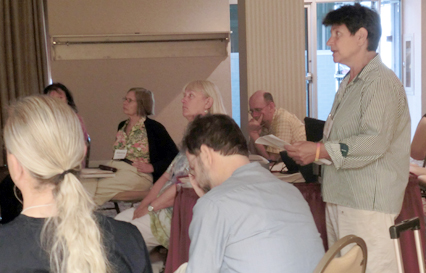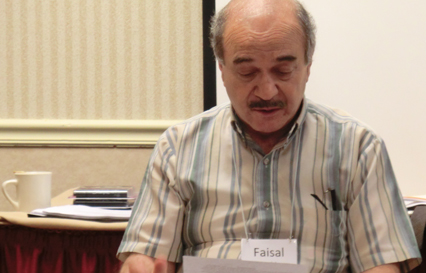Following the General Business Meeting, members of the ASC remembered two fellow cyberneticians who passed away during the past year: Ernst von Glasersfeld and Gary Boyd. Judith Lombardi gave a eulogy to Ernst von Glasersfeld and Faisal Kadri gave a eulogy to Gary Boyd.
A more detailed outline of Judith Lombardi and Ernst von Glasersfeld’s collaboration can be found here.
The text of Faisal Kadri’s eulogy to Gary Boyd:
Gary MacIntyre Boyd was born in Toronto during the depression in 1934, educated at a school where his father was an assistant head master and grew up mainly in Ottawa. He finished his PhD in GeoPhysics from the University of BC then he worked at a large military radar establishment. Gary had two uncles who influenced his career moves; one who was an Avionics Engineer, obviously influenced him in his Radar interest, and another who was a Professor of Education at Wisconsin University. When the funding for the Radar project was lost Gary took an interest in Education like his second uncle and found the bridge that connected technology to education: Cybernetics. He took a position in teaching and research at Sir George Williams University in Montreal in order to move into Educational Technology. Concordia University was formed in 1974 through the merger of Loyola College and Sir George Williams University. Gary continued to serve at Concordia in Educational Technology programs for over 40 years until his passing on April 2, 2011. He was Emeritus Professor of Education.
He was a life-member of IEEE and a member of the American Society for Cybernetics, the ISSS, the ACM, and the American Educational Research Association and various educational technology and Distance Education Associations and the administrative committee of SAVIE Societe pour l’Apprentisage A Vie (e-learning).
Gary was an important figure in learning technology and someone who warned against the hubris of ambitious endeavours in e-learning and its limitations. His main research question was how can higher level learning be better supported by technology? Gordon Pask’s Conversation Theory and Stafford Beer’s Viable System Methodology have been the two main sources of inspiration. His ultimate hope was for educational technology to be used in order to change human nature enough so that our grandchildren’s prospects will be better than those of the one-third of today’s’ children who are existing in abject misery. His recurring theme was people helping people via social change, discourse, art and all other forms of good human expression. His ideas show through his use of complex words which he often invented, perhapse the most descriptive of his research interest is Symviability or the ecological & co-cultural long-term symbiosis, cybersystemic (the Science/Technology of complex co-stearing systems) and advertainments.
He published numerous papers in the British Journal of Educational Technology, the Association for Educational and Training Technology Journal, The Canadian Journal for Educational Communications, Systems Research, and many more.
One of his last great ideas was explained in his paper proposal during ASC’s meeting last year in Troy, NY. Gary said:
Jane Jacobs discusses balancing between two societal moieties ‘traders’ vs. Guardians’.. In my view it should be at least a three way counterbalancing system with the‘creatives’ – artists and scientists who are neither traders nor guardians, but are driven by curiosity and wonder, (rather than greed or fear) constituting the third class of mutually steering actors.
And he goes on to highlight the necessity of some means or (institution) which can put forward “better safer more aesthetically and morally attractive financially acceptable alternatives” to artists and scientists in order to benefit society in a non-exploitive way. If ever such a means or an institution is created then Gary Boyd deserves credit and honor for its implementation.
On the personal level Gary was a warm and approachable person who was liked by many students and colleagues, judjing by the number of students and staff who came to his funeral. As a serious photographer and poet he was concerned with the aesthetic and ethical-moral dimensions of co-control of human learning.
Gary Boyd was a cyberneticist to the core with the theme of this conference, conversational theory, at his focus. Our society lost a valuable asset in his passing, he will be deeply missed.



